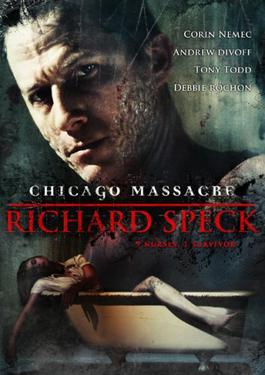Richard Speck was the worst of the worst.
A petty criminal-turned-drifter, Richard Speck fled Texas to avoid being sentenced to prison for his part in a grocery store robbery. He eventually ended up in Chicago, where he lived with his sister and her husband and found occasional work as a seaman. When he couldn’t get work on a boat, the alcoholic Speck supported himself by mugging and burglarizing. It’s not known when he committed his first murder, though it is suspected that it occurred back in Texas. It is known that, in July of 1966, Speck’s sister and brother-in-law finally got sick of dealing with him as a houseguest and Speck ended staying in a series of rooming houses and homeless shelters. On July 13th, the 24 year-old Speck mugged and raped at 53 year-old woman before then breaking into a townhouse that was occupied by nine student nurses. Over the course of the night, he raped and murdered eight of nurses. The only survivor hid underneath a bed until Speck left. She later told police that Speck spoke with a soft Southern accent, had an acne-scarred face, and a tattoo that read Born to Raise Hell.
It was the tattoo that led to his capture. Two days after the murders, with the city of Chicago in an uproar and the police launching a city-wide manhunt to catch the killer, Richard Speck attempted to kill himself by slitting his wrists. He was taken to Cook County Hospital, where Dr. LeRoy Smith saw Speck’s tattoo and called the police.
Though protesting his innocence, Speck was convicted of the murders and sentenced to die. He was spared the death sentence when the Supreme Court briefly outlawed capital punishment. From prison, Speck eventually admitted that he had killed the nurses but he claimed that he was so drunk and high that he had no idea what he was doing. After Speck died of heart failure in 1991, a videotape would emerge of a cocky Speck telling his fellow prisoners that he knew exactly what he was doing and he never felt a bit of guilt. “Just wasn’t their night,” was Speck’s explanation for why the murders happened. Speck also said that if the public knew how much fun he was having in prison, they would have released him for sure. Richard Speck is the type of evil specter who seems to exist to specifically challenge those of us who are opposed to the death penalty. If anyone has ever deserved to be executed in the most painful way possible, it was Richard Speck.
The 2007 film Chicago Massacre stars Corin Nemec as Richard Speck and the film’s makeup department deserves a lot of credit for transforming the handsome and normally quite personable Corin Nemec into the horribly poc-marked Richard Speck. Sometimes, monsters truly do look like monsters and that was definitely the case of Speck. Nemec plays Speck as being a natural-born deviant, a soulless sociopath who has no control over his impulses and who never seems to understand why the world is so disgusted by his crimes. It’s a truly frightening performance.
The rest of the film is a flawed and heavily fictionalized account of Speck’s crimes, imagining that Speck was actually a casual acquaintance of one of the nurses that he killed and suggesting that she was the main reason why he broke into the townhouse to begin with. The history nerd of me cringed when a police chief (Tony Todd) announced that his lead detective (Andrew Divoff) only had two days to solve the murders because the Democratic Convention was coming up. (Speck committed the murders in 1966, two years before the Democrats came to Chicago for their ill-fated convention.) Todd’s police chief says that he’ll be forced to sweep the murders under the rug if they’re not solved quickly but I’m not really sure how that would happen, given the enormity of the crime and the panic that reportedly swept through Chicago as a result. As much as I hate to single out any one performer for criticism (because I usually assume that a bad performance has more to do with the director and the editor than the actor), Joanne Chew, cast in the role of the sole survivor of Speck’s rampage, delivers her dialogue so awkwardly that it sabotages what should have been some of the strongest moments of the film. (Then again, even the best actress would perhaps be challenged by a line like, “I will look the devil in the eye.”)
Filled with flashbacks to both the murder of the nurses and Speck’s life as Texas criminal, Chicago Massacre is an undeniably icky film but given that it’s about Richard Speck, it really should be. When it comes to a criminal like Richard Speck, it’s always tempting to try to look at his life for clues as how to prevent a future Richard Speck from committing a similar crime. But, with Speck, there’s little to be learned beyond the fact that he did what he did because he had no conscience or sense of guilt to mitigate his impulses. Speck had a terrible childhood but many people have had terrible childhoods without turning into mass murderers. Speck was mentally unwell but many people deal with their mental health without turning into mass murderers. In the end, he was a monster. Thankfully, he was also enough of a dumbass to get a tattoo that made it impossible for him to hide from his crimes.

Pingback: Lisa Marie’s Week In Review: 10/9/23 — 10/15/23 | Through the Shattered Lens